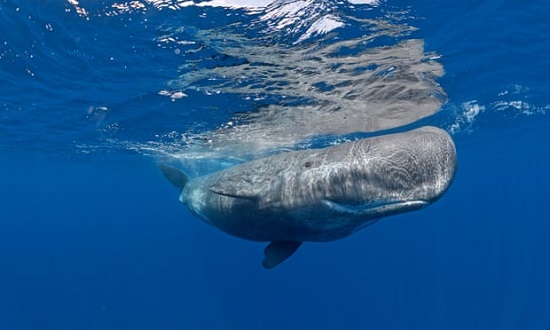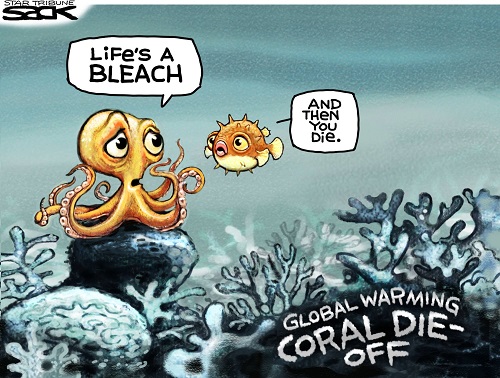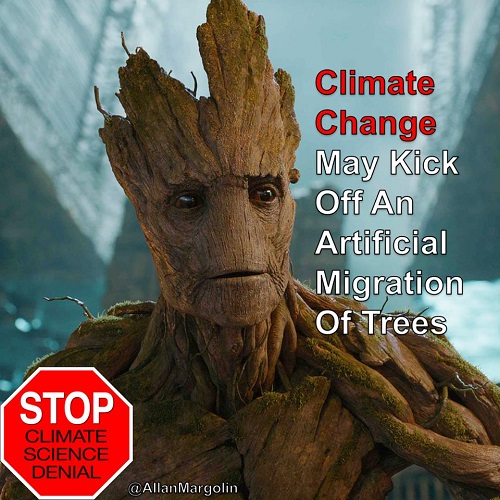2018 SkS Weekly Climate Change & Global Warming Digest #45
Posted on 11 November 2018 by John Hartz
Story of the Week... Video of the Week... Toon of the Week... Coming Soon on SkS... Poster of the Week... SkS Week in Review...
Story of the Week...
Sighting of sperm whales in Arctic a sign of changing ecosystem, say scientists
Rare sighting in the Canadian Arctic as a growing number of species expand their range into warming waters

Sperm whales were spotted in the Canadian Arctic. Photograph: SeaTops/Getty Images
A rare sighting of sperm whales in the Canadian Arctic is the latest sign of a quickly changing ecosystem, say scientists, as a growing number of species expand their range into warming Arctic waters.
Brandon Laforest, a marine biologist with the World Wildlife Fund, and guide Titus Allooloo were working on a project monitoring the effect of marine traffic on the region’s narwhal population when they spotted the pair of large whales just outside Pond Inlet, a community at the northern tip of Baffin Island in September.
Video of the incident, released at the end of October, captures the second known sighting of sperm whales in the region. In 2014, hunters from Pond Inlet spotted them in the area.
At first, Allooloo and Laforest thought the dark shapes in the water were killer whales – another species that has become a frequent visitor to the waters as temperatures creep up. But the distinct shape of the dorsal fin surprised Allooloo – a veteran hunter.
“They’re not known by us, we don’t know too much about them,” Allooloo told the CBC.
Sighting of sperm whales in Arctic a sign of changing ecosystem, say scientists by Leyland Cecco, Environment, Guardian, Nov 5, 2018
Video of the Week...
California now in Perpetual Fire Season. Will Get Worse! Thanks to Global Warming
Northern California blaze quadruples in size, levels Paradise, a town of 30,000; other fires rage near Los Angeles https://www.timesofisrael.com/massive...
Sources Climate Scientist: California Wildfires Are Faster, Stronger, Deadlier & Will Continue to Intensify https://www.youtube.com/watch?v=m9KlV...
As I told @BBCWorld News back in October, California no longer has a "fire season". They have a perpetual fire season: https://twitter.com/MichaelEMann/stat...
The #CampFire in northern California is now the most destructive in the state's history, breaking a mark set...last year https://twitter.com/billmckibben/stat...
California: Hot, Dry, and on Fire https://twitter.com/ClimateSignals/st... Nick Valencia Abandoned cars, burned forests. This is what the aftermath of sheer terror looks like in Paradise https://twitter.com/blkahn/status/106...
Raw footage of Camp Fire evacuees, devastation in Paradise and abandoned Feather River hospital https://www.youtube.com/watch?v=pt_PY...
California wildfires: Paradise, California 'mostly destroyed’ by Camp Fire https://www.youtube.com/watch?v=o2KAC...
Residents flee Northern California wildfire https://www.youtube.com/watch?v=d4kmm... WOOLSEY FIRE NEWS: MALIBU UNDER MANDATORY EVACUATIONS DUE TO CALIFORNIA BRUSHFIRE https://www.newsweek.com/woolsey-fire...
Gov. Jerry Brown: We entered a New Climate & Weather Era https://www.youtube.com/watch?v=cp-P2...
Calif. Governor on Wildfires: 'It's Not Over' https://www.youtube.com/watch?v=n2IgT...
California now in Perpetual Fire Season. Will Get Worse! Thanks to Global Warming, You Tube Video by Climate State, Nov 10, 2018
Toon of the Week...

Coming Soon on SkS...
- What are the climate change consequences of the midterm elections? (Dana)
- Climate science comeback strategies: Al Gore said what? (Karin Kirk)
- Did bombing during second world war cool global temperatures? (Alan Robock)
- New findings on ocean warming: 5 questions answered (Scott Denning)
- New research this week (Ari)
- 2018 SkS Weekly Climate Change & Global Warming News Roundup #46 (John Hartz)
- 2018 SkS Weekly Climate Change & Global Warming Digest #46 (John Hartz)
Poster of the Week...

SkS Week in Review...
- New research, October 29 - November 4, 2018 by Ari Jokimäki
- Climate change science comeback strategies: 'In it for the money' by Karin Kirk (Yale Climate Connections)
- Climate sensitivity uncertainties leading to more concern by greenman3610 (Yale Climate Connections)
- How (not) to talk about Climate Change by Climate Adam (Climate Adam)
- 2018 SkS Weekly Climate Change & Global Warming Digest #44 by John Hartz































 Arguments
Arguments






























Some time ago it was reported that Pacific Salmon are appearing in some Arctic streams. They may be migrating, stream by stream toward the Atlantic. The purists won't be pleased but imagine the great variety of Pacific Salmon in Atlantic waters. Salmo salvar will have some competition.
As this is your first post, Skeptical Science respectfully reminds you to please follow our comments policy. Thank You!
My first!
I’ve been reading for a long time but never wanted to comment. This is probably the best place to ask- for months a skeptical guy at work has been saying that this was going to be a very cold winter because of the sunspot dearth. It’s been an unusually warm Autumn but today was a little odd.
Now I’m down a rabbit hole. What’s the best rebuttal?
Thanks!
LorenzWR @2 ,
I read that the NASA (Goddard Institute for Space Studies) global data show that October 2018 global temperature was +0.99 degreesC above the 1951-1980 reference period [so about +1.77 degreesF ]. (This does not include the poles.)
The other American Agency ( NCDC/NOAA ) not yet released the October figures . . . but they report that the September 2018 was for Northern Hemisphere +0.91 degreesC [ +1.64 degreesF ] above their reference period (they use 20th century average, I gather). This was the 4th hottest September on record (tying with 2017).
Interestingly perhaps, the charts show Canada and Uzbekistan as colder than usual ~ which may be some consolation to your friend.
In the end, we'll just have to wait a few months, and see what the Northern Hemispheric winter delivers. But the world temperature has been climbing steeply for 40+ years, and shows no sign of easing off (because the underlying cause of the warming is continuing unabated).
Your friend should pay less attention to sunspots, and more to the actual heat being radiated from our sun (which has been fairly steady over the past five 11-year cycles of solar activity). If he thinks somehow that solar magnetic flux and cosmic ray intensity are significant players in influencing climate changes . . . then he is very poorly informed, and needs to educate himself.
Overall for the upcoming Northern winter ~ if your friend were betting on a horserace, then I reckon (in view of September/October) that your friend's horse is trailing the field badly as they make the final turn. But it's only over when it's over. And unless it actually falls, his horse must have an outside chance. But we must remember there are another 30+ winters to be run, until mid century ~ and your friend will eventually have empty pockets by then.
Lorenz-was-RIGHT @2,
The idea that a winter can "very cold because of the sunspot dearth" has been proposed by Lockwood et al (2010) but this was firstly a statistical finding so not every year with low sunspot numbers will be cold and secondly it is certainly not a global or even a northern hemsphere statistic but relates to a particular location (the study applied to Central England).
The hypothesis is that low sunspot numbers can result in a more wobbly and static jetstream which in turn can result in a certain location being subjected to freezing arctic winds for weeks on end. The flip-side of this is that other areas will be subjected to warm southern winds for weeks on end.
As you say that the "very cold winter" proposal comes from a 'skeptical guy', it might be worth also pointing to Lockwood et al (2017) who conclude on this matter "The latest science indicates that low solar activity could indeed increase the frequency of cold winters in Europe, but that it is a phenomenon that is restricted to winter and is just one of a complex mix of factors" with Lockwood stressing in an accompanying release "This study provides little solace for the future, as we face the challenge of global warming. Solar activity appears to be declining at present, but any cooling effect that results will be more than offset by the effect of rising carbon dioxide emissions, and provides us with no excuse for inaction."